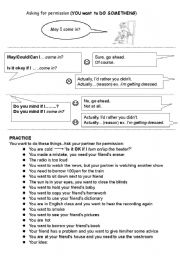
|
Permission & Requests
2 prints for introducing/practicing the very useful English of permission (May I sit here?) and requests (Would you mind opening the window). For lower level students I rec. breaking each print into 2 parts-the first half is easier(May I /Could you...?). The next lesson, review the first half, then teach the slightly harder but very polite (Would y...
Level: elementary
Age: 14-17
Type: worksheet
Downloads: 22
|
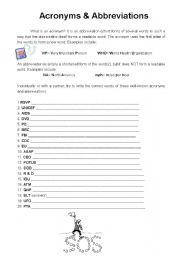
|
Acronyms and Abbreviations
Lesson plan included. Students review well known acronyms/abbreviations, then read newspaper personal ads with discussion.Lesson plan instructions and ideas for extension found on last page. Good for 45 min or longer class...
Level: intermediate
Age: 14-17
Type: worksheet
Downloads: 7
|
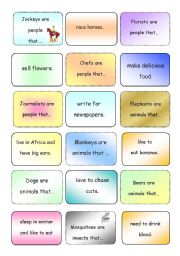
|
That Who Where clauses...
Lesson plan and card set. Students practice making sentences using That/Who/where: ex: A whale is a large mammal that lives in the oceans. Funny combinations will have your students laughing!
Level: intermediate
Age: 14-17
Type: lesson-plan
Downloads: 57
|
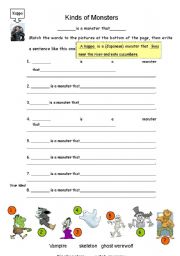
|
Kinds of Monsters
Students write sentences describing monsters using THAT clause (ex. A ghost is a monster that can fly and lives in haunted houses). Adapted from bogglesworldesl.com. Hope you enjoy it!
Level: elementary
Age: 13-17
Type: worksheet
Downloads: 4
|
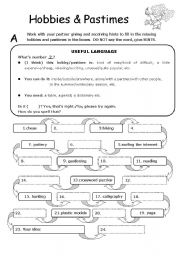
|
Hobbies and Pastimes Pairwork
Pairwork activity: Students give and receive hints to describe/guess the pastime or hobby. Useful language and discussion questions (last page) included.
Level: elementary
Age: 14-17
Type: activity-card
Downloads: 25
|
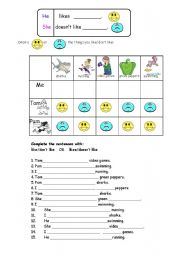
|
He likes/doesn�t like
A very gentle worksheet for younger learners to practice like/likes and don�t like/doesn�t like. Students draw a happy or sad face for the things they like/don�t like (sharks, video games,green peppers, swimming, running). Then fill in the blanks for themselves and 2 other kids (boy and girl).In color but will work black/white as well.
Level: elementary
Age: 7-14
Type: worksheet
Downloads: 57
|
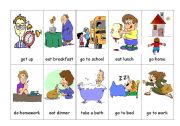
|
Daily Routines Flashcards
Funny/colorful flashcards to practice daily routines. Print out onto cards or print out and paste onto cards (laminate for longer use). 2 copies and you can play Memory. Also can be used for other grammar: (simple past)"I went to school at 8:00", future: What time are you going to school? Goes perfectly with my What time do you....? interview sheet...
Level: elementary
Age: 8-17
Type: activity-card
Downloads: 102
|
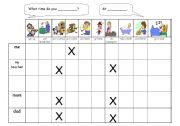
|
What time do you...?
Get students talking with this interview sheet. Made for kids, but also suitable for adults(ideas for adults included). Students ask and answer "What time do you (daily activities)?" "At (time)." Instructions/extention ideas on the second page.Goes well with Daily Routine Flashcards which I have posted.
Level: elementary
Age: 8-17
Type: activity-card
Downloads: 16
|
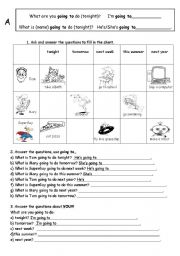
|
What are you going to do?
Pair Work: Students ask and answer "What is Tom going to do tomorrow/next week/etc?" "He�s going to study/take a bath etc." and fill in chart. Then 2 writing exercises answering questions about the characters, and then about themselves (this part could be assigned for homework).
Level: elementary
Age: 14-17
Type: worksheet
Downloads: 18
|
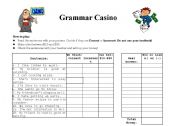
|
Grammar Casino
Students read sentences and decide if they are grammatically correct or not, place a bet depending on how confident they are. When all bets are in, check the sentences as a class. Students add up their wins and loses.
This can be used as a review for gerund (He enjoys skiing) and infinitives (He loves to ski).
Print looks weird when viewed, but i...
Level: intermediate
Age: 14-17
Type: worksheet
Downloads: 10
|